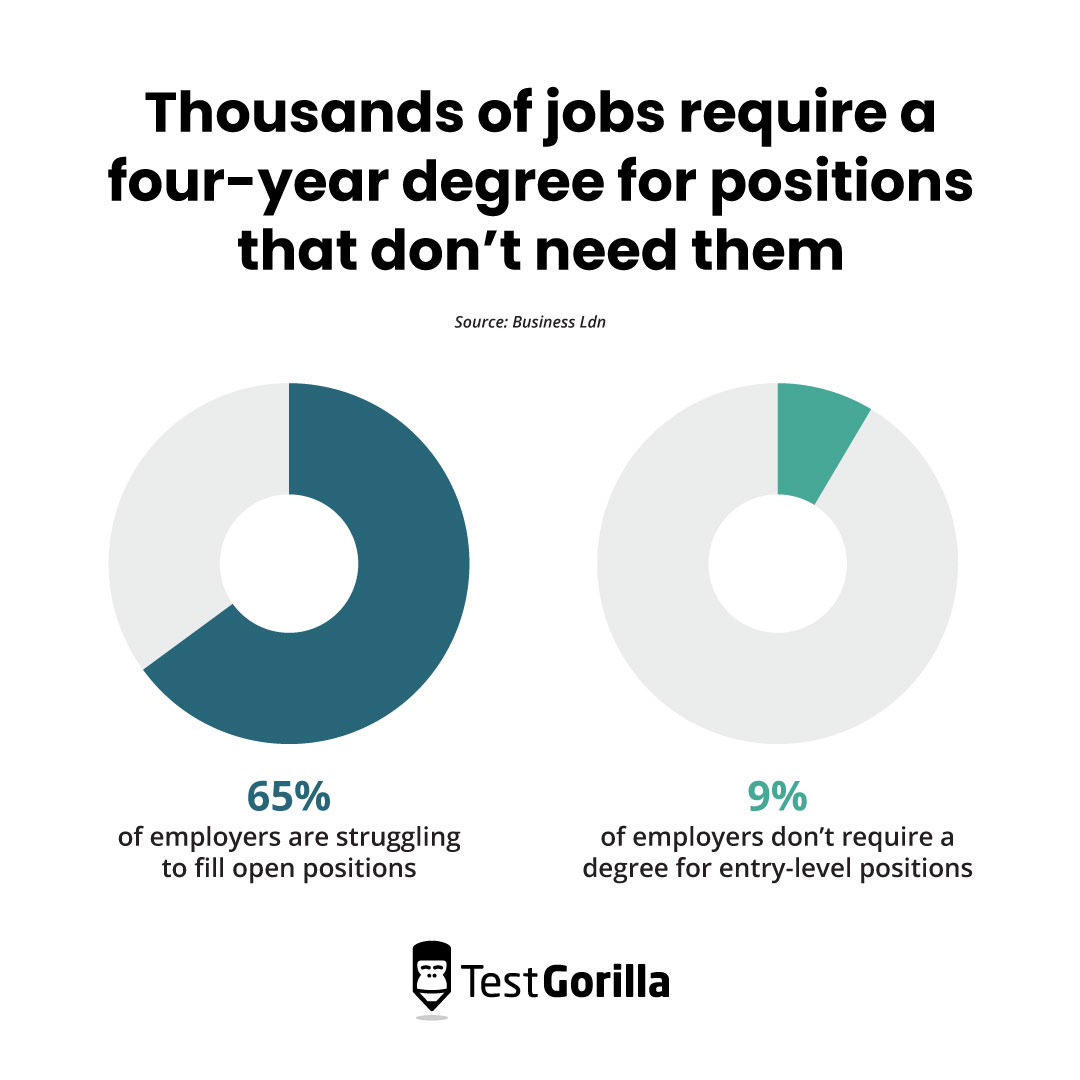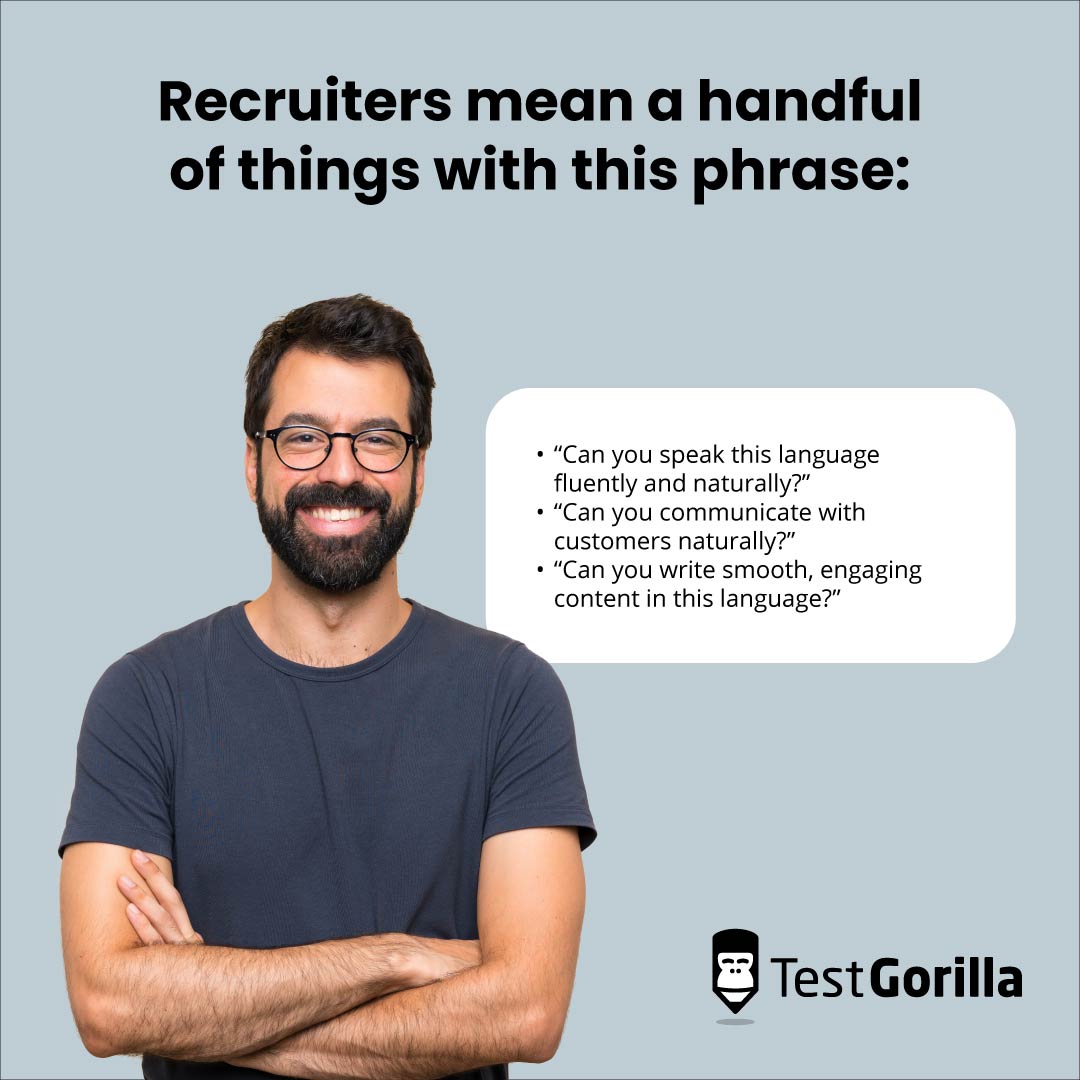The top 7 things that hiring experts and recruiters need to stop saying
There are plenty of common phrases that recruiters rely on during the hiring process. Some people may even call them “tried and true.”
These phrases include things like “Degrees are required” or “You don’t ‘fit’ our culture.”
Sound familiar? Unfortunately, these phrases may be standard, but they’re much more damaging than they seem.
For candidates, they exclude countless individuals and harbor unconscious biases. For employers, they narrow the talent pool and could even lead to costly mis-hires.
After all, do these phrases have anything to do with a candidate’s ability to do intermediate accounting?
This article delves into these problematic phrases, why recruiters say them, and how detrimental they can be to employers and candidates alike.
We also go over how skills-based hiring practices skirt this issue entirely so you don’t have to find the “right” phrase.
Table of contents
- “You’re overqualified.”
- “You don’t have relevant experience/enough experience.”
- “Degrees are required.”
- “Degrees are overrated.”
- “Native language speakers only.”
- “You don’t ‘fit’ our culture.”
- “Stop fidgeting/look me in the eyes.”
- How skills-based hiring overcomes biased phrases and finds the ideal candidate
- Use skills tests to discover real skills without bias
- Sources
“You’re overqualified.”
This phrase is tied to experience requirements and the notion that someone can have qualifications above the role in question.
We believe that experience requirements aren’t necessary in the hiring process and can even be ridiculous. How can a candidate be too experienced?
Often, this phrase leads back to unconscious age discrimination in hiring.
Why recruiters say it
Most often, recruiters say this because of unconscious ageism and a belief in damaging myths.
There are unfortunate stereotypes about the “pitfalls” of hiring older workers:
Technophobia/tech illiteracy
Poor memory
Unwilling or slow to learn
High salary expectations
Absenteeism
Lack of motivation
Let’s get something straight: These are just myths, and it would be a huge detriment to your recruitment process to reject stellar candidates because of them.
Why recruiters need to stop saying it
This phrase is hurting your hiring process. It’s a barrier for excellent candidates to enter your company, which is problematic for employers and candidates.
Ageism is rampant in the recruiting world, but largely unknown or ignored by most professionals.
Here are a few shocking statistics about age discrimination in hiring:
have been asked to provide their date of birth
47% were asked for their graduation date
15% weren’t hired for a position due to their age
Let’s examine that last point more closely. That number only accounts for the candidates who believe they weren’t hired due to their age, not the candidates who gave the hiring manager the benefit of the doubt.
So the number could be much higher.
“You’re overqualified” and similar phrases perpetuate and spread ageism – and they deny excellent candidates a job they want and need.
It’s also a detriment to your company because you’re missing out on an extremely qualified candidate that could bring value to your organization.
It’s also important to consider the legal ramifications of ageism, including potentially violating the US Age Discrimination in Employment Act from 1967.
The exact details of what this means vary a lot from country to country, so if you’re unsure of the specific requirements that apply to you, we advise you to seek legal advice.
“You don’t have relevant experience/enough experience.”
Another experience-related phrase – but this one’s on the other side of the spectrum.
Recruiters need to stop focusing on experience. Experience doesn’t equal skills and capabilities, and requiring it is decreasing your number of quality applicants.
This post from Reddit explains the problem with experience requirements well. They describe years of experience as being tricky with the “sweet spot” being three to five years.
However, one to two years isn’t enough, and anything above eight is “overqualified.”
Too little experience: 0 - 2 years
The sweet spot: 3 - 5 years
Overqualified: 8+ years
These are all unspoken rules that have been in the hiring process so long no one questions it, but they don’t make any sense.
Why recruiters say it
Historically, experience was one of the main ways to assess capabilities.
Around the 1930s and the 1950s, when the resume was gaining traction, it was the best method we had to assess capabilities.
Checking if a candidate had worked in a similar role or had years of industry experience let recruiters know if they could perform the job well. It was the most reliable way to prevent mis-hires.
But things have changed. We now have many other, more accurate methods.
The modern age has given us access to technology and tools with the ability to evaluate skills objectively, so we don’t have to rely on previous work experience.
For more insights on this topic, read our guide on how technology has enabled skills-based hiring and the move away from the resume.
Why recruiters need to stop saying it
Even if it’s a “tried and true” method, experience doesn’t guarantee performance.
A recent study by Chad H. Van Iddekinge of Florida State University aimed to prove this for good. Chad and his colleagues examined 81 studies to find the link between experience and performance and found no significant correlation.
A separate study found that work experience only predicts 3% of job performance.[1]
What does this mean for your company? There are two prominent issues with requiring experience:
Many qualified candidates don’t have the “right” experience
Many unqualified candidates do have the “right” experience
This means that many candidates are suited to the role and don’t have a chance to apply. But, even worse, many candidates have the right requirements but end up as costly mis-hires.
We have too many horror stories of hiring managers relying on experience and resumes. If you’d like to check them out, read our 5 stories from resume recruiting hell (if you dare).
It’s also worth mentioning that some companies take experience requirements too far. This post is an excellent example, where the poster describes a job description they found requiring five to seven years of TikTok experience…
…when TikTok was only five years old at the time.
Experience requirements are not only a good predictor of job performance – sometimes they’re just plain ludicrous.
The best insights on HR and recruitment, delivered to your inbox.
Biweekly updates. No spam. Unsubscribe any time.
“Degrees are required.”
Degree inflation is a real problem.
Thousands of jobs require a four-year degree for positions that don’t need them.
One study found that 65% of employers are struggling to fill open positions, but only 9% of employers don’t require a degree for entry-level positions.
The answer is right there for struggling hiring managers: Remove degree requirements and hire skilled candidates in those difficult-to-fill roles.
Why recruiters say it
Of course, some recruiters use this phrase because college degrees show a candidate is dedicated or has studied certain subjects.
This still doesn’t mean that college degrees are required for a candidate to be dedicated or skilled, but it’s a reasonable reason to rely on college degrees.
But unfortunately, the reason many recruiters say it is because of the degree inflation we’ve experienced over the past 20 years.
In the early 2000s, countless job posts started adding degree requirements to job roles that didn’t need them. This means that many modern recruiters ask for them purely because it’s “what you do” at this point.
And no hiring practice should be done just because “it’s what you do.”
Why recruiters need to stop saying it
When you require four-year degrees, you’re drastically reducing your talent pool. Only 23.5% of Americans have a bachelor’s degree, and even fewer of those people have the skills needed for your open position.
Take a look at how many candidates get excluded from the hiring process when you have bachelor’s degree requirements:
60% of American workers over the age of 25 don’t hold a four-year degree
76% of Black American workers don’t hold a four-year degree [2]
81% of rural Americans don’t hold a four-year degree [3]
83% of Hispanic workers don’t hold a four-year degree [2]
You can see that degree requirements can be detrimental to workplace diversity.
Of course, there are still roles, such as medical and engineering jobs, that require a college degree to gain specialized skill sets.
But there are so many fields where degrees clearly aren’t needed. For example, marketing relies on creativity, innovation, and problem-solving – skills that can develop in countless different ways.
Dropping degree requirements is one of our top methods to include more top talent in your talent pool. To read more on this, check out our guide on how to expand your talent pool.
“Degrees are overrated.”
Does this one seem counterproductive to our last point? It’s all in the wording.
Degrees shouldn’t be required, but that doesn’t mean we should downplay an individual’s achievements.
Using words like “overrated” can make some candidates feel resentful, possibly even turning them off from a skills-based hiring process because they feel disrespected.
Why recruiters say it
This one usually comes from people who are eager to take on a skills-based approach but get a little overzealous. They say it with the intent to be inclusive, but they end up exclusive.
When recruiters say this, they usually mean “degrees aren’t required” but take it just a little too far. They might be trying to emphasize their skills-based process and aren’t even aware of how this phrase damages candidates who’ve spent years earning their college degrees.
Why recruiters need to stop saying it
Implying that “degrees are overrated” is essentially telling a candidate that their hard work was for nothing.
It demeans a person’s accomplishments and tells them that their time, effort, and money were wasted.
Peter Hansen, an account executive, discusses the problems with this phrase in a recent post. He mentions how the two phrases “Degrees are overrated” and “Degrees don’t matter” can be degrading to people who worked hard to earn them:
“Many folks, especially first generation college students (and their families), worked extremely hard to earn these degrees.”
These phrases can also turn candidates off to skills-based hiring practices. From a candidate’s perspective, they may think “skills-based” means “no degrees welcome here.”
This is unfortunate because skills-based hiring finds the best candidate, regardless of background, degree, or lack of a degree.
Skills-based hiring levels the playing field and gives a fair chance to each and every candidate.
“Native language speakers only.”
This phrase is unfortunately common, and it excludes countless amazing candidates.
And why? Because they weren’t born somewhere specific.
A native language isn’t a skill that anyone can learn, and this automatically restricts candidates to certain regions and backgrounds.
Whether or not a recruiter knows it, this is discrimination and leads to unfair hiring.
Why recruiters say it
Recruiters mean a handful of things with this phrase:
“Can you speak this language fluently and naturally?”
“Can you communicate with customers naturally?”
“Can you write smooth, engaging content in this language?”
This is why hiring managers use this phrase – so they should just be asking these questions instead.
This question comes up most often for roles with a lot of precise speaking and writing, such as writers, editors, and customer-facing roles.
Why recruiters need to stop saying it
Requiring native language speakers excludes top candidates from your talent pool, especially when hiring contingent workers and freelancers, a type of work with people from every corner of the world.
Thousands of candidates speak several languages fluently and smoothly. If you learn how to test for language proficiency, you can reap the benefits of this diverse talent.
Using language tests helps hiring managers quickly and accurately evaluate language proficiency without any restricting requirements.
Revolut, a British-Lithuanian financial services company, uses skills tests to assess language proficiency in its hiring process.
In a multinational organization, evaluating language skills is a must, but it can be difficult and tedious to do it manually. However, with skills tests, Revolut was able to improve time-to-hire by 40%.
It’s also important to remember that this is also a legal issue, depending on your region. For example, in the UK requiring candidates to be native language speakers is illegal, but many companies still do it.
The exact details of what this means vary a lot from country to country, so if you’re unsure of the specific requirements that apply to you, we advise you to seek legal advice.
“You don’t ‘fit’ our culture.”
Hiring based on “culture fit” hit the ground running in the 1980s and 1990s, and it’s problematic on quite a few levels.
“You don’t ‘fit’ our culture” is an unfortunately common phrase with:
No basis in capability
No actionable feedback
No way for the candidate to improve and try again
Then a candidate has to walk away from the encounter never knowing exactly what went wrong or how to try again.
Why recruiters say it
It isn’t surprising that this phrase is heard all over the recruitment scene. Culture fit has ruled the working world for far too long.
Recruiters pay attention to culture to ensure candidates reflect the company’s values, show the right behavior, and work well with colleagues – but this phrase isn’t the way to accomplish this.
We can say goodbye to “culture fit” and hello to “culture add” instead.
What’s “culture add?”
Culture add is the practice of aligning a candidate’s values to your organization’s values, but still recognizing and respecting the diversity they bring to the table.
Why recruiters need to stop saying it
Telling a candidate they “aren’t a fit” doesn’t give them useful feedback. Like telling a candidate they aren’t a native speaker, it’s telling them something they can’t hope to change or improve.
This phrase can also unconsciously encourage discrimination against gender, race, and age. For example, an older worker may not “fit” with a team of young digital natives.
Relying on culture fit isn’t an effective business strategy. Many of these decisions are based on gut feelings and not objectivity.
Often, a definition of “culture fit” is obscure and indistinct. One example is Google’s infamous term “Googleyness,” which has come under fire many times for being vague and perpetuating the idea of culture fit.
However, assessing culture add enables hiring managers to still find alignment between candidate and company, like the original goal, but in an inclusive way that increases diversity and nurtures a healthy organizational culture.
“Stop fidgeting/look me in the eyes.”
Many recruiters still hold the belief that fidgeting and lack of eye contact are linked to professionalism.
These actions – and similar ones like restless leg shaking – don’t equate to professionalism, skill, or ability to do the job.
And it’s about time we stopped thinking it does.
Some people may argue it’s about “respect,” but that’s heavily tied to cultural norms. There are cultures where eye contact is considered rude, so fidgeting and eye contact being linked to respect is not a hard-and-fast rule.
Why recruiters say it
Many recruiters hold a preconceived notion that certain factors equate to professionalism, intelligence, and confidence in your own abilities.
Perceived confidence and charisma don’t mean a candidate has skill. There are candidates that practice an interview script in the mirror, ace the interview, and then can’t perform the responsibilities.
Additionally, a lack of confidence doesn’t mean a candidate isn’t skilled. Anxiety during an interview and confidence in your skills are two separate things.
There are also stellar candidates that don’t know the extent of their skills. People with impostor syndrome may not have full confidence in their abilities, but that doesn’t make them less skilled.
Why recruiters need to stop saying it
This phrase is problematic for all candidates. Anxiety during the hiring process is common, and many candidates fidget because of anxiety.
But this is even more of an issue for neurodivergent candidates. Fidgeting (or “stimming”) is a common, natural way for neurodivergent people to self-soothe and is uncomfortable to stop.
Being told to stop fidgeting may cause even more anxiety, causing them to make mistakes they normally wouldn’t.
It’s the same with eye contact. Neurodivergent candidates may feel discomfort, anxiety, and even pain trying to maintain eye contact – when that isn’t a skill related to the job.
This phrase and ones like it are contributing to the regrettably wide ASD employment gap, and the more we relax our standards on fidgeting, the more we help talented autistic candidates find their dream jobs.
How skills-based hiring overcomes biased phrases and finds the ideal candidate
So what do you do instead? Ditch myths and preconceived notions and assess real skills with skills tests.
Candidates complete skills tests after the application stage. These assessments evaluate a candidate’s capabilities and give the results as objective percentages.
Here’s a sample skills assessment for a DevOps Consultant:
SQLite (coding) test
Customer Service test
Critical Thinking test
Problem-Solving test
Culture Add test
These tests and many more can be found in our test library.
Skills testing gives you what you need to hire the ideal candidate: real information on whether or not the candidate can do the job.
This data also gives you a logical, objective reason for rejection. Rather than saying, “You don’t ‘fit’ our culture,” you can show them which scores were below your benchmarks.
Skills-based hiring and skills tests bypass negative thoughts and biases and zero in on true candidate capability.
All the phrases listed here are common, but their time is up.
So instead of relying on these “tried and true” phrases, assess candidates with skills tests and try these instead:
Old phrase | New phrase |
“ You’re overqualified.” | “You have extensive experience that this company would benefit from.” |
“You don’t have relevant experience/enough experience.” | “What sort of alternative experience do you have?” |
“Degrees are required.” | “College degrees are welcome but not required.” |
“Degrees are overrated.” | “College degrees aren’t required.” |
“Native language speakers only.” | “Fluency in XYZ language required.” |
“You don’t ‘fit’ our culture.” | “We’re looking for candidates who exhibit our company’s values of X, Y, and Z.” |
“Stop fidgeting/look me in the eyes.” | Nothing is required from you on this one – just respect the candidate’s personal body language. |
Use skills tests to discover real skills without bias
Phrases like these are holding your hiring process back and keeping top talent from entering your organization.
These phrases might be traditional and “tried and true,” but that doesn’t mean they’re effective. And it doesn’t mean they don’t hold an opportunity for unconscious bias.
The surefire way to ensure you reduce bias and recruit the best talent is by focusing on what’s important: whether or not they can do the job.
For more on this topic, check out our blog post on the 4 habits you need to unlearn to use skills-based hiring effectively.
To take a look at more than 200 skills tests, visit our test library.
Sources
Bock, Laszlo. (April 7, 2015). “Here’s Google’s Secret to Hiring the Best People”. Wired. Retrieved April 20, 2023. https://www.wired.com/2015/04/hire-like-google/
“Highest Educational Levels Reached by Adults in the U.S. Since 1940”. (March 30, 2017). United States Census Bureau. Retrieved April 20, 2023 https://www.census.gov/newsroom/press-releases/2017/cb17-51.html
Marré, Alexander. (April, 2017). “Rural Education at a Glance, 2017 Edition”. USDA Economic Research Service. Retrieved April 20, 2023. https://www.ers.usda.gov/publications/pub-details/?pubid=83077
You've scrolled this far
Why not try TestGorilla for free, and see what happens when you put skills first.

















